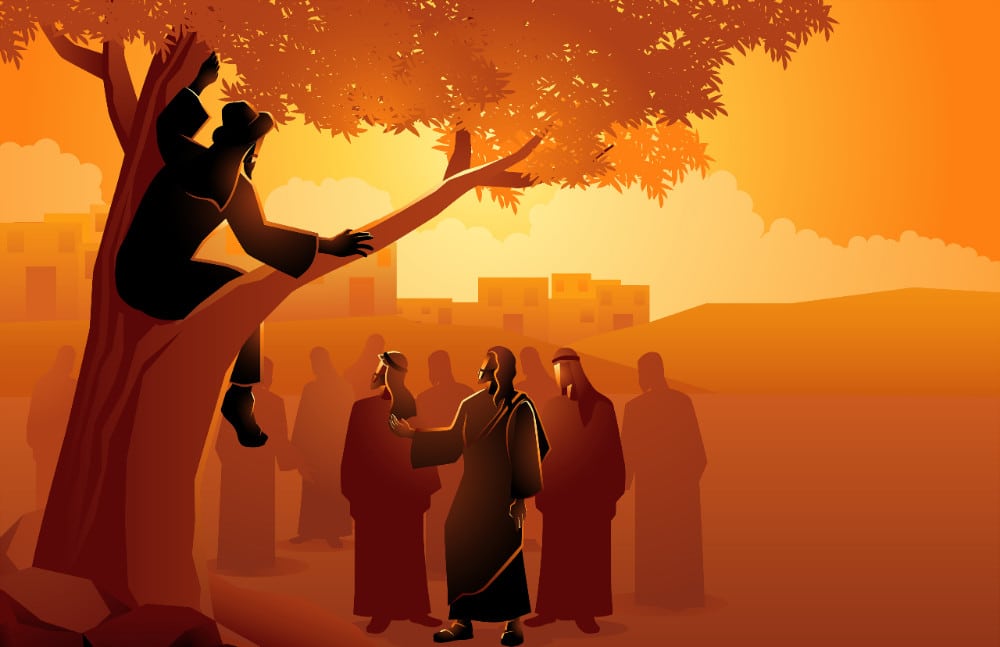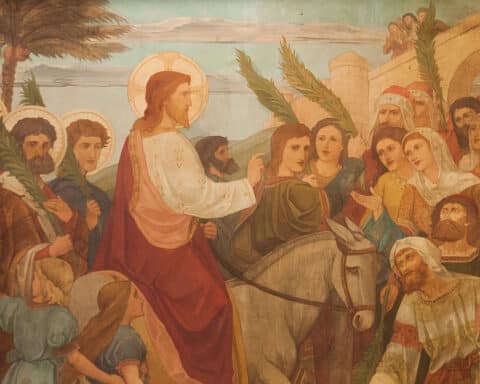
Where I work, at Notre Dame, the campus is full of sycamore trees. They are huge trees with flakey, mottled bark that peels off in patches. You find the bark rolled up like parchment and scattered across the lawn. The leaves are green and fuzzy. They are also quite large, even larger than my head sometimes. To imagine short little Zacchaeus in the branches of a sycamore is to imagine quite a small man in quite a big tree, having climbed up to get a better view.
Zacchaeus gives us a better view, too. As do all the readings for this Sunday.
| October 30 – 31st Sunday in Ordinary Time |
|---|
|
Wis 11:22-12:2 |
The first reading from the Book of Wisdom presents a new perspective: “Before the Lord the whole universe is as a grain from a balance or a drop of morning dew come down upon the earth.” This is the perspective of the Creator. In contrast to God’s greatness, the whole universe is little: but a “drop of dew,” a single “grain.”
Gaining this perspective reveals our littleness. We are the drops of dew, the grains of sand. But it also helps us see the greatness of God’s mercy.
As the Creator of the whole universe, God, as Wisdom also tells us, loves all things and has mercy on all. “How could a thing remain, unless [God] willed it; or be preserved, had it not been called forth by [God]?” God’s mercy reveals that he is truly the “lover of souls.”
Zacchaeus experiences this love for souls. For his own soul.
As we know, Zacchaeus was a wealthy man and a tax collector. The latter of these is synonymous with “a sinner” in our Gospel passage from Luke 19:1-10. But this sinner, Zacchaeus, “was [also] seeking to see who Jesus was.” And this is precisely why we find him in a sycamore tree, its leaves bigger than his head.
Zacchaeus is looking down; he is looking, we might imagine, from the perspective of God’s wisdom. The whole scene is spread out before him. And what does he see amongst the “grain” and “drops of dew”? Jesus! He sees the Creator of the universe become little, like one of us. He sees the greatness of God’s mercy in its fullness. What a view!
But that is not all. Because of God’s “littleness” in Jesus, Zacchaeus is able to not only look down from the sycamore tree but to also “stand before Jesus” and speak with God.
Jesus tells Zacchaeus that he will stay with him in his home. And so God’s mercy came to dwell in Zacchaeus’ own house, the house of a tax-collecting sinner. In this, Zacchaeus experienced the fullness of God’s love for his own soul, though it was but a single “grain from [the] balance.” The others, lacking Zacchaeus’ perspective, grumble. But Zacchaeus rejoices. Indeed, his joy overflows: “Behold, half of my possessions, Lord, I shall give to the poor, and if I have extorted anything from anyone, I shall repay it four times over.”
With his new perspective, Zacchaeus gives everything to the poor, to those previously “too small” for his notice, and worth nothing except his own gain even as an already wealthy man. Zacchaeus now sees the poor from God’s perspective. And he acts mercifully.
But Zacchaeus also sees himself from this perspective, too. He sees himself as a “grain” or a “drop of dew,” an unworthy beneficiary of God’s mercy. And he sees himself as beloved by God.
From Zacchaeus’s perspective, high in the sycamore tree, he perceives both our littleness and God’s greatness. And in the same moment, he sees God as the “lover” of our souls: Zacchaeus’, yours and mine.
Catherine Cavadini, Ph.D., is the assistant chair of the University of Notre Dame’s Department of Theology and director of its master’s program in theology.





